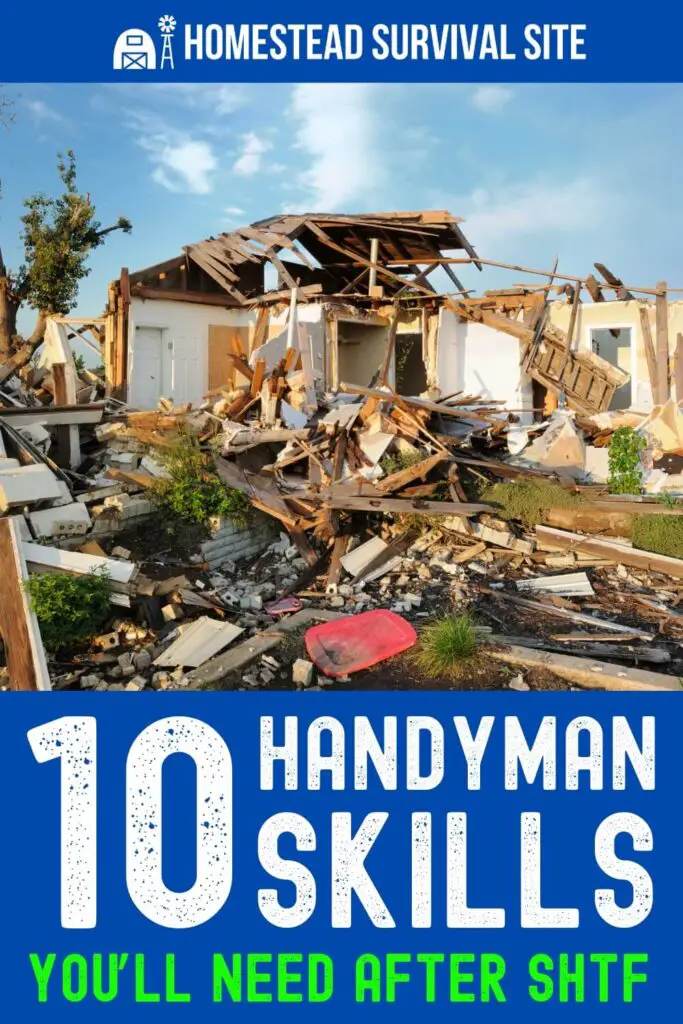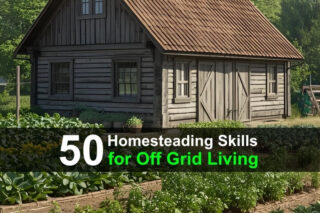Estimated reading time: 10 minutes
What is survival really going to look like in a collapse? When you think of survival skills things like fire, shelter building, water purification, maybe trapping, and foraging come to mind. Truth is, what you consider survivor skills will change dramatically when you are in the thick of it.
Think about it this way, if buy 25 lighters and 10 large ferro rods, the struggle of making fire is pretty much over. Even if you don’t know the basics of fire building, chances are you can get something going with a lighter. Over time you will improve.
However, what happens when you have a leak in your roof and there is no roofer to call? Now that is a much bigger problem and one that is much harder to solve. What if you need something that you are incapable of producing yourself? Wouldn’t it be nice to barter skills for that item.
Want to save this post for later? Click Here to Pin It On Pinterest!
Nobody to Call
Which systems can you repair in your home? Can you deal with major plumbing issues? What about electrical? With the advent of things like powerful solar generators, there is a good chance that preppers are going to have some kind of power source in the home, post collapse. Will you get yourself killed working on an electrical system?
When these systems fail you in a collapse the most important thing to understand is there will be no one to call. If you need to repair or replace something, then it will either be up to you or someone in your community/group/neighborhood.
To combat that, now is the time to focus on the skills, texts, and tools that you need to repair your home and the things on your property. If you have the skills, tools, and the instruction then you will be able to at least give those repairs your best shot.
Your Handyman Library
Books will be everything in a collapse. Without YouTube and video instruction at our disposal we will be left with others’ knowledge and the knowledge of our own libraries. If you had to depend on your own survival library right now, would you be able to sustain yourself and your family in times of collapse?
Below I have given you 5 important books, well one is a collection of books, that I think all preppers and survivalists should have on hand. With instructions like this you will at least have a reference when taking on repairs.
- The Family Handyman
- Handyman 100 Things Every Homeowner Must Know
- Handyman in your Pocket
- Do It Yourself Encyclopedia Set
- The Home Blacksmith
1. Basic Carpentry
Most of your home is made of wood. If you need to reframe something in your home it takes the ability to measure, cut, and manipulate wood. The fundamentals of carpentry are straight forward, and carpentry can be learned by anyone.
- Knowing the different types of wood
- Choosing the right wood for the job
- Having the right tools
- Knowing how to measure
- Knowing how to joint wood
- Learning finishing techniques and tools
None of these are particularly hard to learn with practice. However, once you know the basics you have the ability to produce whatever you can dream up. With basic carpentry you can also repair things in your home or in the homes of others.
This skill is another powerful bargaining and bartering chip.
2. Rudimentary Blacksmithing
Blacksmithing might be one of the most overlooked skills that the average person can easily learn and practice. Most people do not realize how affordable it can be and how easy it is once you get some practice under your belt.
The cheapest setup is going to include a small propane forge with a piece of railroad track as an anvil. You can be all in for under $200. I used vice grips for months before I even bought some quality tongs. My first “hammer” was a 4lb one handed sledgehammer and it worked well on discount for $10.
Basic blacksmithing will give you the ability to do things like bend metal into shapes that solve problems. Sure, it is nice to know how to make tomahawks and throwing knives but in my years of blacksmithing it has been the bending of steel to create curtain rods, and towels rods, fire picks, and S hooks, that has made the difference.
You can repair locks on gates or create your own, and these things are just as important as a new knife. With some very basic skills in blacksmithing you can make your own nails! This is the mentality and the possibility of rudimentary blacksmithing.
Through the centuries one of the most important and influential people in any town were the blacksmiths. In a collapse that will be no different.
3. Basic Car Maintenance
It seems like with every passing year cars become more foreign by design. There is more computer than metal in a vehicle these days. Still, there are some things that you can do for your vehicle, and should know how to do, if you plan on maintaining it during a collapse.
Remember, all it takes is an inverter and your gas engine can generate electricity to power your home and other things. So, even if the car is damaged during a disaster and you cannot drive it if the engine runs it will still have utility.
At the very least you should know how to change the air filters in your vehicle, check and fill fluids, and of course change the tires. A better understanding of your vehicle is always going to help you out. That said, you are severely limited in what you can repair with modern vehicles.
4. Door & Window Repair
Have you ever framed anything before? When a window is broken or a door is not working right, your entire home is at risk. Collapse doesn’t always have to be about bad guys breaking into the doors and windows.
Good doors and windows are just as important to keeping warm during the winter. The most dangerous thing in a collapse can be a draft! The cold is a threat that you face everywinter day. Understanding that cold air seeping into your home can be just as deadly as the chance run in with a bad guy is crucial to surviving a collapse.
Learning how to frame doors and repair windows should be way up on your list because keeping warm is a survival skill. Good doors and windows are also going to take the burden off other resources like fuel and wood used to keep the home warm.
5. Basic Plumbing
Managing water in a collapse is going to be a big part of your life. If you are no longer on tap water, then you are going to have a new water system that you depend on. If you understand basic plumbing techniques, then you will be able to run pipes and use valves to take full advantage of your rainwater catchment system.
The use of caulk and rubber cement to fix leaks is also a skill that you should practice if you do not already know it. Also, how to deal with clogged pipes and drains.
Remember, if you can makeshift a new water system for your own home that could also be a way you make money or barter skills in a collapse.
6. Roofing
Your roof is everything. When a roof goes your entire survival shelter, AKA your home, is at risk. If you know how know how to repair a roof, then that is a huge skill that literally comes into play every time there is a disaster.
Whether we are talking about massive collapse or a simple hurricane, roof repairs are common. Without contractors and professionals to show up and handle that for you, it all comes down to what you can do.
Of course, you are going to need the materials to repair a roof, too. You will need things like plywood, shingles, tar, and underlay. This is where your handyman library will come in to play.
7. Electrical Wiring Basics
You can get hurt blacksmithing; you can get hurt doing basic car maintenance but if you mess up with electrical wiring then you could verily easily kill yourself. So, this is not a handyman skill you just jump into.
At the very least you should cut the power to everything that is being worked on. I would recommend quality books on electrical wiring and taking all the safety measures you can.
Now, you might be asking yourself, why electrical wiring. The grid will likely be down in a full-scale collapse. That could be but some of us will still want to run power. I operate a Titan solar generator from Point Zero Energy that is tested and assembled right here in America.
8. Anchoring with Concrete
You are likely to either repair, rebuild, or build something new during a collapse or in the preparation of one. Knowing how to dig the right sized hole for anchoring lumber and how to mix and pour concrete so that it will harden properly is essential.
If you are going to build something to support your survival, then it should be fortified, and this is a great way to start a build on solid ground.
This is not a very complicated skill, but I would recommend doing it at least once while you have everything at your disposal.
9. Flooring Repair
Most people don’t consider the floors underfoot. Someone has laid those floors. There is a subfloor that holds it all up. If you do not at least understand the makeup of flooring in a home, then it will be very hard for you to repair them.
Having the tools to remove tile and other flooring is very important. Thoroughly inspecting the remaining floor and subfloor is also crucial if you hope to repair or replace the flooring. An understanding of the types of flooring you can use is also important.
Our homes are convenient because of modern flooring but beyond that, these tight boards and tiles, along with the subfloor act as a barrier against pests.
10. Waste Management
The least glorious of all the tasks on this list could be the most important. The management of human waste and trash is hidden from our view, for the most part. In a collapse the trashmen will not pull up each week and the toilets will no longer flush.
Whether through burning, burying, recycling, or composting, if you can provide a solution for dealing with the waste of your group, crew, MAG, or even the entire neighborhood, your skills and work ethic will be invaluable.
I know handymen who make a great living,in the here and now, and a large part of their business is managing waste to one degree or another. This is a skill that does not get the respect it deserves but will be the difference between life and death in a collapse.
Final Thoughts
While preparing for a collapse can often feel like a wargame, we must be holistic in our approach. Your hammers, wrenches, and shovels are likely to get more work than your AR15. Many of us are stuck in a post-apocalyptic fantasy loop where survival is all about fighting off marauding factions, sanitizing water, and scavenging food.
It will probably look a lot more like fixing things for yourself and for others. Daily maintenance on things like gardens and water systems will be more of your life than any tactical operations. Then, of course, there will be waste. You are always going to have daily waste to deal with.
Handyman skills may not be as glamorous or as exciting as a new weapon for the armory, but these daily maintenance tasks will likely dominate your life. They will make you money and provide you with reliable water and shelter.
There is much more to prepping for collapse than beans, bullets, and Band-Aids.
Like this post? Don't Forget to Pin It On Pinterest!
You May Also Like:











